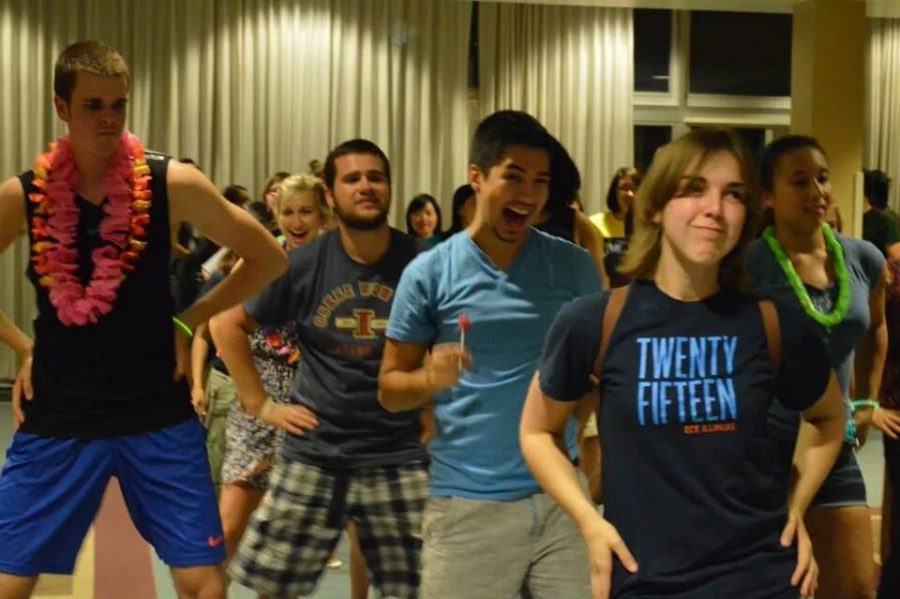Ryan Kenji Kuramitsu explains his duties, responsibilities as an RA
Oct 7, 2014
Whether working for University Housing or Private Certified Housing, resident advisers are meant to serve as an authority figure on a floor. But more so than that, they become a community organizer, event planner or simply a person to talk to.
Ryan Kenji Kuramitsu, senior in Social Work, knows these responsibilities all too well. He’s served as an RA in both Private Certified Housing and University Housing for three years.
Currently an RA at ISR for approximately 55 students, Kuramitsu sat down with The Daily Illini to share his typical schedule, what he enjoys most about his job and some recommendations to any future RAs.
Daily Illini: How long have you been an RA?
Ryan Kenji Kuramitsu: Technically, this is my third year of being an RA, although I had worked for private housing for a half a year and then got an apartment, so if you’re doing it in general time, it’s really two and a half years, but really like … three years.
Get The Daily Illini in your inbox!
DI: Why did you choose to be an RA in the first place?
RKK: I think part of it is definitely motivated by the financial benefit — free housing, free room and board — especially because I didn’t receive a lot of scholarships to come to college and I wanted to be able to help my parents financially by not being as big as a drain … I also feel like I’ve always had an affinity for working with students who are younger than me at the residence halls in general, so it really is a good thing.
DI: What’s your favorite or most interesting part of your job?
RKK: I think it would have to be when residents let you into their lives; it’s really unique in the way that they live with you and share their life stories. … That could be through having a conversation with them when they need it, (or helping them in similar ways). … It can become hard in a variety of things, but that’s probably my favorite part.
DI: Could you take me through a typical week as an RA at ISR?
RKK: We have all sorts of responsibilities. Every 10 days we have to be on duty for a whole night, which is generally not fun, especially if it’s on a weekend. We have to be indoors all night. But generally throughout the week we just have to be in and around our community and create … bulletin boards, (fliers) and all sorts of programming.
DI: Was being an RA in private certified housing different from University Housing?
RKK: I feel like (private certified housing) was a lot different. I feel like there’s less social cohesion in a lot of ways. There is not nearly that much emphasis at all, either with your training as a paraprofessional or programs for the residents, in multiculturalism and diversity or issues with social justice. I found that to be almost nonexistent living in private housing and working as an RA in private housing. Whereas the University has a very strong inclusive and diverse … identity, I guess. That’s one main difference.
DI: Do you have any advice to give for anyone hoping to apply for an RA position?
RKK: Definitely make sure you’re doing it for the right reasons. You also have to be able to be confident enough to lead a floor and enforce policies, and you have to have discussions about things that you might not otherwise have the ability to have those discussions about. I think an RA position is like the fallback, (meaning that) the University has to try to make sure less people ‘fall through the cracks,’ and you really have to care about people, and you really have to like to be around your residents … and just have a passion for kind of being a role model almost to them.
DI: What do you appreciate about being an RA?
RKK: It’s a great experience for me personally as a social work student because I’m more able to practice what I’m learning in my courses by talking with residents on the floor and try and advocate for them, which fits really nicely with my personal (goals). There are RAs who are engineers, who are anthropology majors, and I think we all bring something good to the table. So that’s what I really appreciate about working with University Housing too, is the diversity of our staff.
DI: Is there anything else that you would like to share about serving as an RA?
RKK: One last thing I would say is that I see the RA as not an authoritarian figure that needs to be respected and feared on the floor, but serve as an advocate for students and help them with resources as I mentioned and stick up for them. We’re often painted in a negative light, I think, but really we’re doing this job because we care about people.
Reema can be reached at [email protected].






